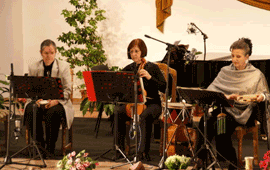> [Archived] Chronicles

In Memoriam Robert Dumitrescu
But Verona Maier announced that the Studio has created a 'Robert Dumitrescu' Prize awarded for 'preoccupations in old music', offered to the guitarist Costin Soare, the one who afterwards performed superbly, in his own way, Sarabande and Giga from Suite no. 1 for lute by Bach, composer whose creation the same Verona Maier has chosen a Coral for organ, bringing calm and sobriety to the collectedness and reconciliation; and in the medieval Suite from the 9-12th century adapted by Robert Dumitrescu, the atmosphere of old, elegant, delicate and often filled with joy has been emphasized through the diverse percussion, the viola da gamba tenor's volutes and the soprano Georgeta Stoleriu's voice who then, in another Robert Dumitrescu work - Moldavian-Wallachian Echoes – has also maintained the translucent and full of charm percussion, while Anca Iarosevici and Eugen Popa embroidered a dialogue of great finesse, pointed out by pizzicato and glissandos, also by the chant with Byzantine tint of a filigree beauty. The prayer and the sounds 'of cathedral' were found in Domine Deus by Vivaldi, the soprano giving an extra refinement to the melodic line which, completed by the organ and the viola da gamba, rose with simplicity and faith, atmosphere prolonged through the Coral BWV 659 by Bach, performed by Verona Maier and Anca Iarosevici with gravity and again with a sober collectedness. And after the medieval suite from 12-13th century, Cantigas de Santa Maria by Alfonso X El Sabio (adapted by Robert Dumitrescu), full of gracefulness and light (the soprano also performing at lute, appealing to percussion as Verona Maier is accompanied by the viola da gamba tenor of Anca Iarosevici), the vibrant and heavy voice of Georgeta Stoleriu has impressed, as usual, in the terrifying Our Father by Felicia Donceanu, fulfilling with an ardent and deep human feeling that atmosphere which stood the whole evening under the sign of prayer and of priority religious music highlighted by the musicians of the Old Music Studio and their collaborators, therefore praising the memory of the one who was Robert Dumitrescu.
Translated by Ioana-Alexandra Dumitrescu and Elena Daniela Radu
MTTLC, The University of Bucharest














